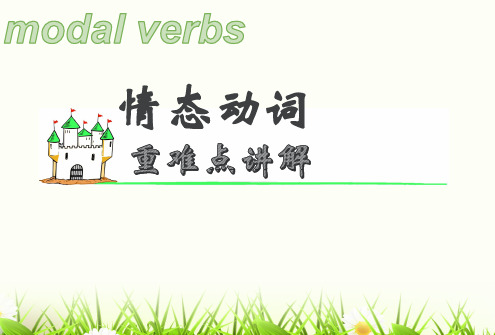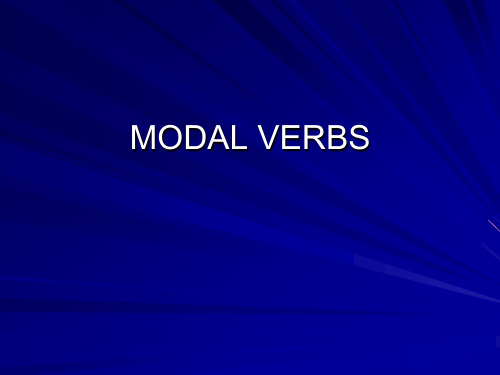Modal Verb Tutorial
- 格式:doc
- 大小:119.00 KB
- 文档页数:12





Modal Verbs(Can, may, must)Rui yi ling Teaching content:Modal verbs (can, may, must)Teaching aims:1. Review and master the usages of some modal verbs like “can, may, must”.2. Sum up and grasp the structures of these modal verbs.Teaching important point:How to correctly use modal verbs, esp. for the ones expressing possibility.Teaching difficult points:How to correctly choose modal verbs in different situationsTeaching type:A revision lessonTeaching methods:Review, explanation, inductive methods.Teaching aids:A projectorTeaching procedures:Step 1 GreetingsGreet the whole class as usual.Step 2 Revision and PresentationT: We have learned modal verbs before. Now let’s have a little quiz.students to write their answers on the Bb, and then check the answers with the whole class.Answers: 1. The light is on. 1) He may / might / could / be at home.2) He must be at home.2. The light is off. 1) He may not be at home.2) He can’t be at home.Step 3 ExplanationT: Let’s sum up these modal verbs. First get Ss to read through the points on Page 60 in revision book, and then show the following on the screen.He may be at home. (“Perhaps”)May He may not be at home. (“Uncertain”)You may go home. (“Permission”)(Expressing “guess” in the affirmative or interrogative.)He can’t be at home. (“Be certain---not”)It can be warm in winter. (“Occasional possibility”)Can---” “have a right to---”)Can you help me? (“Request”)(Expressing “guess” in the interrogative or neg ative.)He must be at home. (“Certain”)Must I must go home. (“What is necessary”)You mustn’t smoke here. (“Be forbidden to---”)(Expressing “guess” only in the affirmative.)T: Now let’s continue with some synonyms and sentences. Look at them on the screen.the negative. You can use either of them. “Be able to” sometimes means “succeed inStep 4 PracticeRewrite sentences. (Give Ss a few moments. Let them do some relevant exercises on the screen.)1. Perhaps we will have a good trip.We_____ have a good trip.2. I’m sure it isn’t made of gold.It _____ be made of gold.3. I’m sure that restaurant is a good one.That restaurant _____ be a good one.4. There is much gas here, you ___ smoke here.Step5 Summary of the usages of mo dal verbs which express “guess”T: All right. Look at the form on the screen.T: In affirmative sentence, we use “must+V” or “must be doing” to express present or present co ntinuous situation. “Must +have + p.p.”is used to express past situation orin the affirmative or negative. “Can” mainly in the negative or interrogative.Step 6 PracticeFill in the blanks using must/might/may/can/could and their negative forms. 1.—Look! Someone is coming: Who ____ it be?--It ___ be the headmaster.--It ___ be him. He has gone to Shanghai.--It ____ be Mr. Yang. He looks like the headmaster.2. – Could I borrow your dictionary?--Yes, of course you ____.3. I thought you ___ like something to read, so I bought you some books.4. Peter ___ come with us tonight, but he isn’t very sure yet.5. She doesn’t answer the bell. She ___ be asleep.6. The ground is wet. It ____ have rained last night.7. He is writing with a pencil. He ___ have lost his pen.8. A computer ___ think for itself; it ___ be told what to do.(Get Ss to do some exercises on the screen individually, and then discuss them in pairs, at last check their answers with the whole class.)Homework:Finish off the exercises.To continue reviewing Modal verbs.。

modal verbs 英语解释Modal verbs are a category of English verbs that are used to express possibility, necessity, permission, ability, and other similar ideas. They are unique in the sense that they do not have a specific tense and do not change form depending on the subject of the sentence. Instead, they are followed by the base form of another verb to complete the sentence.There are ten modal verbs in English: can, could, may, might, shall, should, will, would, must, and ought to. Each of these modal verbs has its own specific uses and meanings, but they all serve to modify the meaning of the main verb in a sentence. Modal verbs can also be used to express different degrees of certainty or obligation, depending on the context.One common use of modal verbs is to express ability or possibility. For example, "I can swim" or "It may rain later." In these examples, "can" and "may" are used to indicate the ability to swim and the possibility of rain, respectively.Modal verbs are also often used to express permission or obligation. For example, "You must wear a helmet" or "You may leave early if you finish your work." In these examples, "must"indicates a strong obligation to wear a helmet, while "may" grants permission to leave early under certain conditions.Modal verbs can also be used to make requests, suggestions, or offer advice. For example, "Could you help me with my homework?" or "You should get some rest." In these examples, "could" is used to make a polite request, while "should" is used to offer advice.It is important to note that modal verbs do not change form depending on the subject of the sentence, and they are always followed by the base form of another verb. For example, "She can swim" and "They can swim" have the same form of the modal verb "can," and both are followed by the base form "swim."In conclusion, modal verbs are a versatile and important part of the English language that are used to express a wide range of meanings and functions. They play a crucial role in shaping the tone and meaning of a sentence, and can convey nuances of certainty, possibility, obligation, and more. Understanding how to use modal verbs correctly can help improve your English language skills and make your communication more precise and effective.。